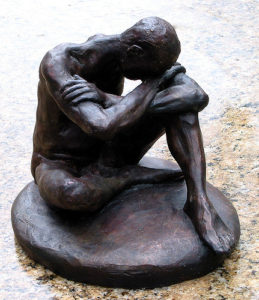Just so you know, these words are from the shortest verse in the Bible. From the story of Jesus grieving at the graveside of his good friend Lazarus.
But there is another moving story about this passionate man that comes to mind as I read the news these days. As that story goes, Jesus rode into the city of Jerusalem, not on a prancing war steed, but rather on the back of a humble donkey. The crowd cheered, hoping he would be the one who would overturn the Roman occupiers. Instead Jesus carried a Roman cross to his own execution just a few days later while this same crowd jeered.  In the days between the two processions, it is said that Jesus looked across at his beloved city and wept.
In the days between the two processions, it is said that Jesus looked across at his beloved city and wept.
If only.
A bomb ripped apart the diplomatic district in Kabul, Afghanistan. They say over 90 people died and more than 400 are wounded. Many are women and children.
Another bomb blasted a concert hall in Manchester, England. 22 people died and over 100 are wounded, many of them teenagers with their moms.
Three Good Samaritans were slashed by a white supremacist on a Portland Oregon commuter train. Two died and the terrorist railed on defiantly about his patriotism.
Montana congressional candidate Greg Gianforte body slammed a reporter to the ground and then lied about it. He won his election the next day.
Texas Legislators brawled in the final hours of the 2017 regular session, threatening to shoot each other in the head.
And this morning we watch in shock as reports continue to come in from Las Vegas about the worst mass shooting in America’s history. And gun stocks are becoming more profitable on Wall Street.
And Jesus weeps.
If only we knew the things that make for peace.
A certain Christianist has been applauding the violence recently by calling for a “more violent Christianity.” I refuse to even mention his name and relate the ugly things he has said except that he claims body slamming, bullying and violence is what biblical, godly authority is supposed to look like.
Even more recently, a famous (infamous) megachurch pastor in Dallas applauded Trump’s bellicose rantings against North Korea. Robert Jeffress way of interpreting Scripture led him to proclaim that a biblical passage in the book of Romans endowed “rulers full power to use whatever means necessary — including war — to stop evil.”
I call BS on such heresy.
Jesus has shown us that non-violence is the only way to peace. Mahatma Gandhi has shown us. Martin Luther King Jr. has shown us. Non-violence is the only power that can reverse our adverse cycles of violence. It is only non-violence that stands tall with its unique ability to demonstrate true authority by virtue of its integrity.
But somehow we still don’t get it. Our human thirst for war and violence keeps us spiraling down into vicious cycles of hopelessness and we can’t figure out how to rise above this baseness.
And Jesus weeps.
Philosopher Rene Girard has written extensively about patterns of human violence. “Redemptive violence,” he calls this thing we do. We make ourselves feel better by convincing ourselves that violence is necessary retribution. Someone ought to pay. “An eye for an eye, a tooth for a tooth,” seems logical and needful to us in our human ways of making sense.
But violence never makes sense. It is a foolish, childish, non-sense response to the challenges of our humanity.
What does make sense – if we are willing to see its wisdom – is Jesus carrying his cross into the worst hell his enemies could muster. It is Gandhi fasting and resisting the colonial might of all England. It is King dedicating his life, and giving his life, for The Beloved Community. It is Imams and Rabbis and Priests marching and praying together in solidarity in Manchester. It is Taliesin Myrddin Namkai-Meche and Ricky John Best stepping up to defend two frightened girls and resisting the hatred of their attacker even at the cost of their lives.
These are some of the people who have understood what makes for peace. And people like these are the ones who understand that peace is not wimpy, fragile acquiescence. It is not holding hands and singing KumBaYa.
Peace is not simply the absence of conflict; rather peace is the active presence of justice.
Non-violence demands a strong and sturdy courage. As ― Shane Claiborne has said in his wonderful book, Common Prayer: A Liturgy for Ordinary Radicals:
Peacemaking doesn’t mean passivity.
It is the act of interrupting injustice without mirroring injustice,
the act of disarming evil without destroying the evildoer,
the act of finding a third way that is neither fight nor flight
but the careful, arduous pursuit of reconciliation and justice.
It is about a revolution of love that is big enough to set both the oppressed and the oppressor free.
Don’t tell me love is not enough;  I know better. And Taliesin knew and Martin knew and Mahatma knew and Jesus knew.
I know better. And Taliesin knew and Martin knew and Mahatma knew and Jesus knew.
May we all weep for the cycles of violence that continue to rend the fabric of our world.
May we weep at the hardness and the smallness of our hearts.
And may we find the sturdy courage to walk boldly into the revolution of love.
Sculpture weeping man 1 by R.O. Flynn
Taliesin Myrddin Namkai-Meche // Noelwah Netusil
Please read this powerful essay by Taliesin’s professor at Reed College. Professor GhaneaBassiri speaks to the love that motivated this remarkable young man.
Charlotte Vaughan Coyle lives in Paris TX and blogs about intersections of faith, culture and politics on her website and Intersections Facebook page.  She is national president for Coffee Party USA and contributes regularly to the Join the Coffee Party Movement Facebook page.
She is national president for Coffee Party USA and contributes regularly to the Join the Coffee Party Movement Facebook page.
Charlotte is an ordained minister within the Christian Church (Disciples of Christ) and also blogs about Scripture from a progressive Christian approach in her Living in The Story Musings.